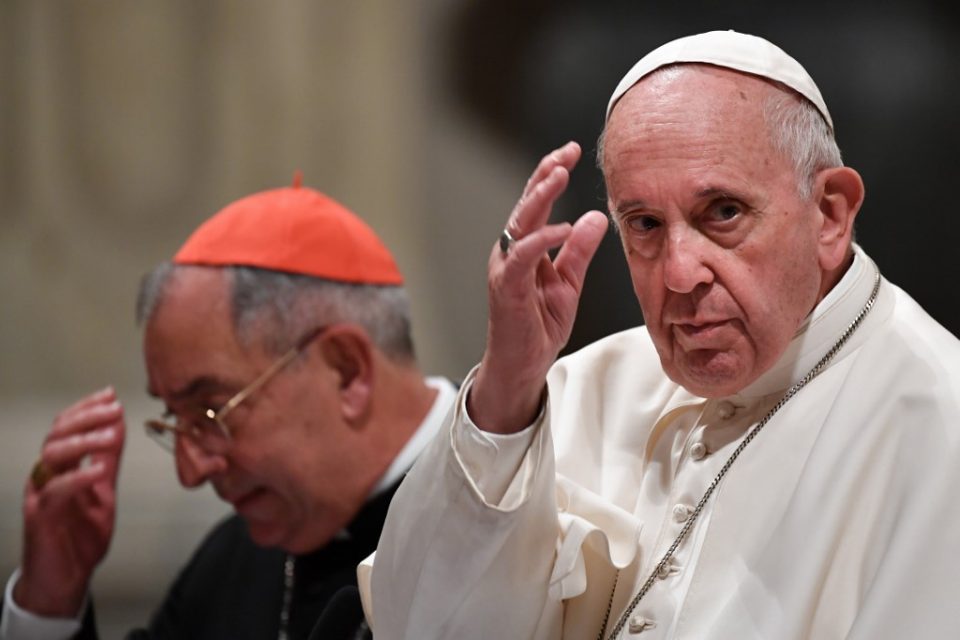
by Ella IDE
Agence France Presse
VATICAN CITY (AFP) — Catholic Church’s Pope Francis on Thursday passed a landmark new measure to oblige those who know about sex abuse in the Catholic Church to report it to their superiors, in a move which could bring countless new cases to light.
Every diocese in the world will now be obliged to have a system for the reporting of abuse, under a new law published by the Vatican following a global clerical paedophilia scandal.
But the requirement will not apply to secrets revealed to priests in the confessional.
It is time to learn from the “bitter lessons of the past”, Francis said in the text of the legal decree, which comes into effect on June 1.
It follows a series of clerical assault cases in countries ranging from Australia to Chile, Germany and the US.
The “Motu Proprio”, a legal document issued under the pope’s personal authority, declares that anyone who has knowledge of abuse, or suspects it, is “obliged to report (it) promptly” to the Church, using “easily accessible systems”.
Under the new measure, every diocese around the world is obliged by June 2020 to create a system for the reporting of sexual abuse by clerics, the use of child pornography and cover-ups of abuse.
The law could see the Vatican inundated with reports of abuse or cover-ups, as it applies retroactively, meaning those who know about old cases are obliged to flag them up as well.
– ‘Bring predators to justice’ –
The impact “likely will be felt most intensely outside the West, since places such as the US, Canada and some parts of Western Europe (though, ironically, not the pope’s backyard in Italy), already have fairly robust reporting systems,” said Vatican expert John Allen, on the online religious newspaper Crux Now.
The law only applies within the Church and has no force to oblige individuals to report abuse to civil authorities.
“The Motu Proprio shows Pope Francis expects swift and comprehensive progress,” commented Cardinal Daniel DiNardo, head of the Bishops’ Conference in the United States, where thousands have people have reported abuse.
It will “empower the Church everywhere to bring predators to justice, no matter what rank they hold,” he said.
The US-based Survivors Network for those Abused by Priests (SNAP) said “mandated reporting is a good thing” but added in a statement that “we would have been far more impressed if this new law required church officials to report to police and prosecutors”.
The document focuses particularly on the sexual or psychological abuse of children and vulnerable adults, but also targets sexual abuse and violence resulting from an abuse of authority — such as the exploitation of nuns by priests.
Pope Francis admitting publicly in February that priests have used nuns as “sexual slaves” — and may still be doing so.
– ‘Exhaustive in scope’ –
“The new norms… are exhaustive in scope, applying in some way to every ordained or vowed member of the 1.3 billion-person church,” Vatican watcher Joshua McElwee wrote in the National Catholic Reporter.
That raises the question as to how realistic it is for the Vatican to promise a response to reports within 30 days, particularly considering there are scores of cases currently backlogged, Allen said.
Victims’ groups have long called for Francis to put in place concrete measures to tackle clerical child abuse, but they want more, including the immediate dismissal of any cleric found guilty of even a single act of abuse, or of covering it up.
They also want all abusers or suspected abusers to be reported to police, and any abuse-related files handed over to them.
Some have called for priests who hear of abuse during confessions to be forced to report it. The new law stops short of that.
Catholics believe that within the confessional the penitent is talking to God, and everything in the confession is secret. A priest who reveals such secrets is automatically expelled from the Church.
© Agence France-Presse








